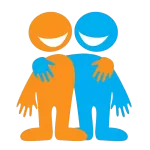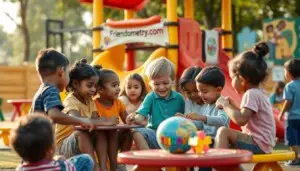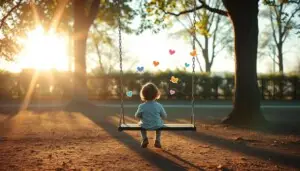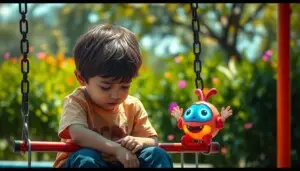Lonely Child Psychology: Loneliness can affect a child’s growth, affecting their feelings, social skills, and how they function. Not all kids find it easy to make close friends. This part examines why friends matter a lot for kids and why some might feel lonely. Knowing what makes kids feel lonely helps us help them better.
Friendometry.com—Ending Childhood Loneliness, Achieving Happiness. Making a difference one child at a time. Website: https://friendometry.com/. Friendometry.com is a place for kids to find friends. It’s also made for parents to arrange playdates for their kids. Just having one friend can change a child’s life.
Key Takeaways
- Loneliness can greatly affect a child’s feelings, social skills, and growth.
- Kids need to have close friends, but some find it hard.
- Knowing why kids feel lonely helps us help them better.
- Websites like Friendometry.com help parents find friends for their kids, making a big difference.
- Just one friend can help a child feel like they belong and boost their confidence.
The Impact of Loneliness on Child Development
Friendships and Emotional Well-being
Friends are key to kids’ happiness and growth. They help kids learn to listen, solve problems, and express themselves. Kids may feel left out, unseen, or bad about themselves without friends. This can make them feel anxious and sad and struggle with their mental health.
A study in the Great Smoky Mountains found 12.6% of kids had anxiety disorders. Another study in Dutch twins showed loneliness has a strong genetic link, affecting 37% to 55%.
Friendometry.com is a site for kids to find friends. Parents make it for setting up playdates. Having just one friend can help a child, as loneliness comes from both genes and the environment.
Loneliness can lead to serious health issues, like heart disease, and make teens feel more depressed. How kids feel lonely changes over time and affects who they hang out with and their experiences with others. This affects their social skills, self-expression, and confidence.
Potential Reasons for Childhood Loneliness
Children can feel lonely for many reasons. Each reason affects how they make friends and connect with others. It’s important to know why kids feel alone to help them.
Social Skills Challenges: Some kids don’t know how to act with others. This is true for those with ADHD, autism, or non-verbal learning disorders. They find it hard to make friends because of this.
Anxiety and Depression: Kids with anxiety or depression find it challenging to be around others. They might think negatively and feel sad, which stops them from making friends.
Environmental Factors: Where a child is can make them feel lonely. For example, they might not fit in if they don’t share the same interests as their friends or are younger. This makes it hard for them to connect with others.
| Potential Reasons for Childhood Loneliness | Prevalence |
|---|---|
| Lack of social skills | Prevalent among children with ADHD, autism, or non-verbal learning disorders |
| Anxiety and depression | Can significantly contribute to feelings of loneliness in children |
| Mismatch with a social environment | It is common for children who don’t fit in with their peers or are younger/less mature |
We can help kids feel less alone by understanding why they might be lonely. This helps us find better ways to help them make friends and feel like they belong.
Signs and Effects of Lonely Child Psychology
It’s important to know the signs of loneliness in kids. Young kids might make up friends or want too much attention. They could also seem shy and unsure. Teens might stay in their rooms, talk badly about themselves, or stop caring about friends.
Behavioral and Emotional Signs
Kids who feel lonely show many signs, like:
- They might not want to be around others and like being alone more
- They can have trouble showing how they feel and understanding their emotions
- They might use technology too much to feel connected, which can make them feel lonelier
Physical and Mental Health Effects
Feeling lonely can hurt a child’s body and mind, including:
- It can make them stressed and sleep poorly
- They might get headaches and other physical issues
- They could be more likely to get depression and anxiety
- They could be more at risk of using substances and having suicidal thoughts
It’s key to helping kids who feel lonely feel better and grow up healthy.
| Behavioral Signs | Emotional Signs | Physical Effects | Mental Health Impacts |
|---|---|---|---|
| Withdrawal from social situations | Difficulty expressing emotions | Increased stress | Depression |
| Preference for solitude | Reliance on technology | Poor sleep | Anxiety |
| Timid and unsure behavior | Negative self-talk | Headaches | Substance abuse |
| Seeking excessive attention | Withdrawal from friendships | Physical symptoms | Suicidal thoughts |
The Role of Lonely Child Psychology in Online Interactions
In today’s world, kids and teens have new ways to meet others online. But, these online spaces can be tricky. Social media and online gaming can help some young people make friends and feel supported. Yet, they can also lead to cyberbullying, being left out, and seeing things that make them feel alone. It’s key to see how a child’s online life might affect their loneliness.
Recent studies show how big this issue is. They found 77 articles about the internet and loneliness from 2000 to 2010. Then, 177 articles from 2011 to 2018, and 394 in 2019 or later. A 2021 study found a link between internet addiction and feeling lonely.
Loneliness made depression and anxiety worse in kids and teens during the COVID-19 pandemic. Also, more young people became addicted to the internet, which hurt their mental health.
Friendometry.com is tackling this issue with a new approach. It’s a friend finder for kids, made for parents. It helps set up playdates for kids. Just having one friend can really help a lonely child.
| Statistic | Value |
|---|---|
| Articles on the internet and loneliness (2000-2010) | 77 |
| Articles on the internet and loneliness (2011-2018) | 177 |
| Articles on social isolation, loneliness, and internet use (2019 or later) | 394 |
| Accesses to the research article “Understanding Lonely Child Psychology.” | 6660 |
| Citations of the research article on lonely child psychology in online interactions | 2 |
Friendometry.com and similar projects aim to help parents and kids deal with online loneliness. They focus on building real friendships. This can lessen loneliness’s bad effects and improve online time for young people.
Strategies for Addressing Childhood Loneliness
Loneliness is a big worry for kids, even in school. We need a strong plan to help them feel better. Parents, caregivers, and teachers are key in making this happen.
Conversational Approaches
Talking openly with kids is very important. Parents and caregivers should say, “I get it,” and listen well. This helps kids feel understood and builds trust.
Facilitating Social Connections
Getting kids into after-school clubs, community, or church groups greatly helps. These places let kids make friends and learn social skills.
Sometimes, seeing a therapist or counselor can help. They can teach kids how to deal with feelings and make friends better.
Using parent support, helping kids with social skills, and getting them involved in the community can help kids feel less lonely. This builds a strong base for their feelings and friendships.
The Genetics and Neuroscience of Loneliness
Loneliness is not just an emotional state – it has deep roots in genetics and the brain. Research shows some people might be more likely to feel isolated. This is because of their genes.
The brain areas that handle physical pain also react to being left out and alone. This shows how big of an effect loneliness can have on us. Chronic social isolation is linked to depression, anxiety, and PTSD, posing real threats to vulnerable individuals. This highlights the need for social connections.
Google searches show that loneliness is now seen as a major health issue and even a cause of death. Knowing the biological reasons behind loneliness helps us find ways to tackle this problem.
Genetic Factors in Loneliness
Studies point to a genetic link in loneliness. Some people might be born more likely to feel isolated. Research shows social isolation affects the brain’s emotional centers.
Neurological Factors in Loneliness
Studies on mice found certain brain cells react to being alone, making them want to be with others. This shows how our brains handle social situations.
Research on mice also found treating certain brain cells helped reduce anxiety and depression in lonely mice. This shows how our brain chemicals play a role in loneliness. Knowing this can help us find new ways to fight loneliness.
| Statistic | Significance |
|---|---|
| 46% of socially isolated children are at risk of cardiovascular disease 20 years later | Shows the long-term health risks of feeling lonely as a child. |
| Loneliness is associated with cognitive impairment among older men and women in China | Points out how loneliness affects thinking skills at any age. |
| No association was found between loneliness, episodic memory, and hippocampal volume change in young and healthy older adults | This indicates that loneliness might hit harder in certain groups or situations. |
By looking into the genetic and brain reasons for loneliness, we can make better ways to help people and communities deal with this issue.
Lonely Child Psychology and Social Isolation Across the Lifespan
Loneliness isn’t just for kids. It can follow us into adulthood, affecting our mental and physical health. Studies show that feeling lonely as a child or teenager can lead to depression and anxiety later. Being alone can also make us stressed and increase the risk of heart disease. It’s important to tackle loneliness at any age for our well-being.
A 2018 survey by Cigna found nearly half of U.S. adults felt alone sometimes or always. About 40% said they felt isolated, and their relationships lacked depth. Not having friends can be as bad as smoking or drinking too much.
Feeling lonely is worse for us than being overweight. Over a quarter of Americans live alone, a record high. Many are single, and family sizes are getting smaller. Fewer people are helping out in their communities, showing a drop in social ties.
A Pew Research survey found loneliness makes people unhappy with their lives. A 2019 study showed being alone increases the risk of dying early, more so for black people. It also raises the risk of heart disease and dementia in whites.
Loneliness can lead to a 30 percent higher risk of stroke or heart disease. It also increases the risk of dementia in older folks by 40 percent. But, staying healthy, being social, and having less family stress can help older adults feel less lonely.
It’s key to tackle loneliness in kids, teens, and adults to keep everyone healthy. This helps prevent the bad effects of being alone on our minds and bodies throughout life.
Friendometry.com – Ending Childhood Loneliness, Achieving Happiness. Making a difference one child at a time. Website: https://friendometry.com/ Friendometry.com is a friend finder for kids. It’s made for parents to arrange playdates for their kids. Just one friend can change a child’s life.
Conclusion
Childhood loneliness is a big issue that affects a child’s growth and happiness. We can help kids by understanding why they feel alone. This helps us support them in making friends and dealing with feeling left out.
Having friends is very important for kids. Just one good friend can change a child’s life. Loneliness can lead to feeling sad, heart problems, and thinking issues. We must act fast to protect kids’ mental and physical health.
There are tools like Friendometry.com to help kids meet others. These tools fight loneliness and help kids feel connected. By focusing on their social health, we can make sure they live happier lives. This shows us the need for early action, the big effects of loneliness, and the help available for kids to make friends.







